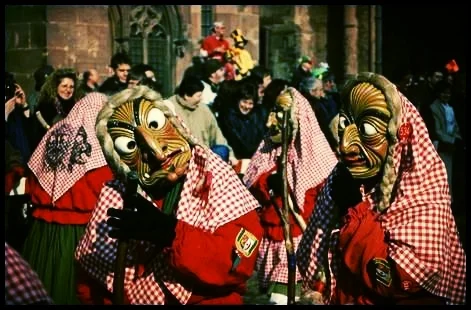Fasching: Nothing is Forbidden
Living in Germany can often feel like living in a parallel world, especially when it comes to celebrating common festivals. Lent is a great example of this. In the UK, we have Pancake day, in Germany there’s the ‘Fifth Season’ of Fasching or as the English-speaking world knows it, Carnival. When someone mentions Carnival, most minds will be transported to the streets of Rio de Janeiro, rather than the neatly maintained centres of Cologne, Mainz or Dusseldorf. It certainly came as a surprise to me that Germany celebrates the build up to Easter with parades and festivities. As I watched a Fasching (Carnival) parade for the first time, I couldn’t help but feel jealous that the Germans partied before Fastenzeit (lent), with some areas even having a public holiday, while the UK had somehow settled for making pancakes on Shrove Tuesday. I couldn’t help but wonder why exactly we had given up a weekend of drinking and partying for a single evening that revolved around futile attempts to flip a pancake.
As with most things in Germany, carnival is serious business. Cologne and Dusseldorf are generally agreed to be the epicentres, but the celebration extends to many different states, each with their own particular take. In some, the focus is on the parade, while in others it’s the televised Fasching party, where dancers, comedians and politicians take the opportunity to lampoon themselves. Fasching is a celebration of role reversal, where the social norms are suspended and effectively anything goes, which is why it’s not surprising to find photos of usually austere politicians dressed as Shrek or Captain Jack Sparrow. The importance of carnival to many Germans cannot be understated, it is a festival with its roots in the medieval era and it is carefully overseen by a collection of long-lived carnival clubs, with memberships that can go back many generations. People here talk with reverence about their own childhood experiences of Fasching, preparing costumes or taking part in the local parade. Describing carnival as sacred might be extreme, but it’s certainly in that neighbourhood.
However, the reverence afforded to Fasching has not protected it from the realities of the 21st century. Over the last two or three years, Fasching has increasingly been criticized, or rather the costumes worn by some revellers have been criticized, for perpetuating negative racial and cultural stereotypes. Kindergartens have felt compelled to write to parents asking them not to dress their children as Native Americans or sombrero wearing Mexicans. Carnival clubs, that for decades wore blackface and afro wigs, have faced justified criticism that racist depictions have no place at Fasching. In turn, there has been a counter-backlash from those who see their near sacred traditions of Carnival being eroded by outsiders or worse still by the demon of political correctness, a victim of a left-wing culture war that cares nothing for German culture.
For a migrant like myself, the lines of acceptability seem clear. In the most of the English-speaking world, Blackface has become taboo. The furore Canadian PM Justin Trudeau’s history of blackface is only one example of this. In Germany, the lines are not so clear. A simple google search of ‘Fasching Politiker’ brings up images of German politicians dressed as Native Americans, “African” tribesman, or bizarrely, Gandhi.
German friends can suddenly become defensive and even hostile to any accusations of racism surrounding Fasching costumes. For a lot of people, racism doesn’t come into it. More than once I have heard the argument that Fasching should be free from criticism because it is a traditional celebration, where people are only looking to have fun. I have sympathy for those who argue that only a minority wear the most objectionable costumes, but year after year I still see “Indianer Kostüm” on sale in many places, replete with Tomahawks and peace pipes.
Another defence is that these costumes are a celebration of the culture they depict, rather than a joke at the expense of marginalised groups. This argument seems to revolve around the idea that costumes don’t hurt people, that because no offense is meant, no offense should be taken. Yet, this position only seems logical if you ignore huge parts of our interconnected histories. There appears to be a clear gap in understanding; not between left or right, English speakers or non-English speakers, but between the majority white experience, and the experiences of people of colour and other minority groups. In these situations, I defer to the experts, those people who have everyday experiences of racism and discrimination. In this vain, it is important to listen to those who began the ‘Ich bin kein Kostüm!’ (I am not a costume) campaign in 2017.
I do believe that it’s possible for someone to wear a racist costume and not be racist, and I genuinely believe (as surprising as that might seem) that many people in Germany have no idea that blackface, or their costumes, are based on colonial stereotypes and racist fantasies. The truth is those people who might wear a Native American costume have probably never met a Native American and likely have a limited understanding of what that actually symbolizes. Additionally, the often used term ‘African Culture’ or simply ‘Africans’ denotes a superficial understanding of the African continent and the myriad nations within it. Yet, ignorance has never been a defence. These arguments seem wholly designed to deflect any accusation of racism, a term that perhaps carries a heavier burden for Germans who are well versed in their own country’s history.
It is this last point that I find the most surprising; Germans know their history and traditions far better than many countries and are all the better for it. It is therefore surprising to me that people who seem so thoughtful and careful about their own past, seem so reluctant to accept the historical experiences of marginalised groups and that some so forcefully defend the right to wear problematic costumes. I understand the fear that traditions will be irreparably changed, but it seems to me that if a tradition comes at the expense of denigrating, simplifying or humiliating the culture of a marginalised group, it isn’t much of a tradition at all.










